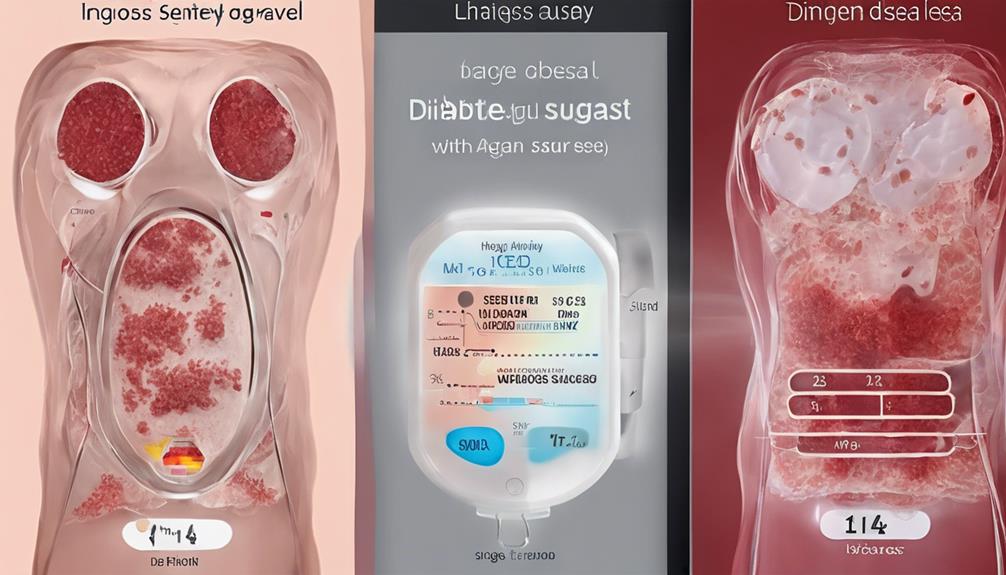Have you ever considered the effects sea moss has on insulin sensitivity and blood glucose levels, in addition to its established benefits for diabetes management?
Dive into the intriguing relationship between sea moss and diabetes as we explore the nuanced ways in which this seaweed may offer support for those dealing with this condition.
From its rich nutrient profile to its potential effects on blood sugar regulation, sea moss presents an interesting avenue worth exploring for individuals looking to enhance their diabetic diet.
Key Takeaways
- Sea moss may improve insulin sensitivity.
- Zinc in sea moss aids blood sugar regulation.
- Seamoss supports diabetes management effectively.
- Professional guidance recommended for incorporating sea moss into diabetic diet.
Potential Impact on Insulin Sensitivity
Sea moss exhibits promising potential in enhancing insulin sensitivity through its rich content of nutrients like magnesium, fucoxanthin, and iodine, which collectively contribute to better glucose control and improved response to insulin. Magnesium plays a crucial role in insulin action, with studies suggesting that low levels of this mineral are associated with insulin resistance. Fucoxanthin, another component of sea moss, aids in decreasing insulin resistance, thereby improving the body's ability to respond to insulin effectively.
Furthermore, iodine present in sea moss supports thyroid function, which influences insulin production and blood sugar levels. By incorporating sea moss into the diet, individuals may experience benefits in managing diabetes by potentially preventing blood sugar spikes and supporting overall insulin sensitivity. The essential minerals found in sea moss offer a natural approach to enhancing insulin sensitivity, which is integral in diabetes management.
Research indicates that sea moss holds promising prospects for individuals seeking to improve their blood sugar control and response to insulin.
Blood Sugar Regulation and Seamoss

Transitioning from the potential impact on insulin sensitivity, exploring the role of sea moss in blood sugar regulation reveals its effectiveness in managing diabetes through various mechanisms. Sea moss, with its rich nutrient profile, contributes significantly to blood sugar control.
Here are some key points to consider:
- Sea moss contains soluble fiber like carrageenan, which slows down glucose absorption, aiding in blood sugar regulation.
- The zinc content in sea moss plays a crucial role in managing blood sugar levels, making it beneficial for diabetes management.
- Sea moss helps stabilize blood sugar levels and may prevent spikes, contributing to better control of diabetes.
- Studies suggest that sea moss can impact insulin levels, potentially lowering blood sugar levels in individuals with diabetes.
Health Benefits for Diabetics
In considering the health benefits for diabetics, it is crucial to acknowledge the significant impact of essential minerals and nutrients found in sea moss on insulin sensitivity and blood sugar regulation. Sea moss contains zinc and magnesium, which play a vital role in improving insulin sensitivity in diabetics. Additionally, the iodine present in sea moss supports proper thyroid function, essential for insulin production and blood sugar control. The fiber content in sea moss is beneficial for diabetics as it slows down glucose absorption, helping to stabilize blood sugar levels and prevent spikes. Studies suggest that incorporating sea moss into a diabetic diet can aid in managing diabetes effectively, promoting weight management, improving digestion, and reducing the risk of heart diseases.
| Health Benefits for Diabetics |
|---|
| Improved Insulin Sensitivity |
| Stabilized Blood Sugar Levels |
| Weight Management Support |
Incorporating Seamoss Into Diabetic Diet

When considering dietary modifications for managing diabetes, it can be beneficial to explore the incorporation of seamoss due to its potential impact on blood sugar regulation and overall health.
Seamoss can slow down glucose absorption, thanks to its carrageenan content, which can aid in blood sugar regulation for diabetics. The high levels of zinc found in seamoss play a significant role in managing diabetes by helping to maintain adequate levels of this essential mineral in the body.
Additionally, seamoss is rich in vitamins and minerals with anti-diabetic properties, making it a valuable addition to a diabetic diet. Its fiber content is also noteworthy, as it helps stabilize blood sugar levels, offering a supportive supplement for individuals managing diabetes.
Introducing seamoss into a diabetic diet should be done under professional guidance to maximize the potential benefits for blood sugar control and overall health.
Risks and Considerations for Diabetics
Considering the potential interactions with medications and the risks of excess iodine intake, it is essential for diabetics to approach the incorporation of sea moss into their diet with caution and guidance from healthcare professionals. Sea moss can pose risks for diabetics due to its ability to interact with medications like thyroid medications and blood thinners. The rich iodine content in sea moss may be harmful, particularly for individuals with thyroid disorders. Diabetic patients must consult healthcare providers before adding sea moss to their dietary regimen to ensure safety and avoid potential complications in diabetes management. It is crucial for individuals with diabetes to be aware of the risks associated with sea moss use and seek professional advice before making any dietary changes.
| Risks and Considerations for Diabetics | ||
|---|---|---|
| Interact with Medications | Excess Iodine Intake | Thyroid Disorders |
| Potential Complications | Diabetes Management |
Frequently Asked Questions
Who Should Avoid Seamoss?
We should avoid seamoss if we've iodine sensitivities, thyroid disorders, are on blood thinners or thyroid medications, have allergies to carrageenan, are pregnant or breastfeeding, or have seafood or seaweed allergies.
It's crucial to consult healthcare providers before consuming seamoss to prevent interactions and potential adverse effects on hormone levels.
Being cautious about these factors can help us make informed decisions about incorporating seamoss into our diet safely.
What Are the Risks of Taking Seamoss?
Taking sea moss may pose risks due to potential interactions with medications such as thyroid meds and blood thinners. Excessive iodine levels in sea moss can be harmful, especially for those with thyroid issues.
It's crucial to consult healthcare providers before adding sea moss to your diet to minimize potential complications. Being aware of these risks and seeking professional advice before dietary changes, including incorporating sea moss, is essential for safe consumption.
What Happens to Your Body When You Start Taking Sea Moss?
When we start taking sea moss, our bodies undergo positive changes. Improved gut health, weight management, and heart benefits are common.
Sea moss can help lower bad cholesterol and blood pressure, while providing essential nutrients like iodine, magnesium, and zinc.
This superfood also aids in blood sugar control and insulin sensitivity. Overall, incorporating sea moss into our diet can lead to a range of health improvements.
Is Seaweed OK for Diabetics?
Absolutely, seaweed can be a great addition to a diabetic diet! Its high fiber content slows down glucose absorption, aiding in blood sugar control.
The antioxidants in seaweed can improve insulin sensitivity and reduce inflammation, crucial for managing diabetes.
With low calories and numerous nutrients, seaweed supports overall health.
Always consult with your healthcare provider before adding seaweed to your diet to ensure it aligns with your individual needs and medications.
Conclusion
In conclusion, incorporating sea moss into a diabetic diet may offer valuable benefits for managing diabetes.
While some may question the validity of natural remedies, the nutrient-rich profile of sea moss and its potential impact on insulin sensitivity and blood sugar regulation can't be ignored.
Consult with a healthcare professional before making any dietary changes, but consider the potential advantages sea moss could provide in supporting overall health and diabetes management.









